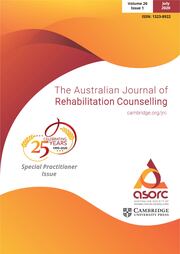No CrossRef data available.
Article contents
Training in the Health of the Nation Outcome Scales: An Australasian Opportunity to Integrate Cultural Context in Mental Health Outcome Ratings
Published online by Cambridge University Press: 23 February 2012
Abstract
This article draws on the experience of training mental health professionals as part of the New Zealand Casemix Classification and Outcomes Study (NZ-CaOS) and outlines the training conducted in the use of the primary measure, the Health of the Nation Outcomes Scales (HoNOS). It identifies the need to extend training to consider the contexts of culturally diverse populations, and describes assessment and interpretation implications for the introduction of this measure as part of routine clinical practice in Australia and New Zealand. Training in the HoNOS provides an opportunity to support the continued development of culturally responsive assessment in Australasian clinical practice. However, these opportunities will only be realised if there is continued development of how outcome measurement tools such as the HoNOS are interpreted and rated, and continued consideration of the role that cultural context plays in the lives and presentation of mental health consumers.
- Type
- Articles
- Information
- The Australian Journal of Rehabilitation Counselling , Volume 11 , Issue 1 , January 2005 , pp. 34 - 39
- Copyright
- Copyright © Cambridge University Press 2005


